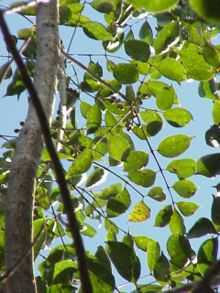Bursera
From Wikipedia, the free encyclopedia
| Bursera | |
|---|---|
 | |
| Bursera simaruba | |
| Scientific classification | |
| Kingdom: | Plantae |
| (unranked): | Angiosperms |
| (unranked): | Eudicots |
| (unranked): | Rosids |
| Order: | Sapindales |
| Family: | Burseraceae |
| Genus: | Bursera Jacq. ex L.[1] |
| Type species | |
| Bursera simaruba (L.) Sarg. | |
| Species | |
|
About 100, see text. | |
| Synonyms | |
|
Elaphrium Jacq. | |
Bursera, named after the Danish botanist Joachim Burser (1583-1639) is a genus with about 100 described species[2] of flowering shrubs and trees varying in size up to 25 m (82 ft) high. They are native (often for many species endemic) to the Americas, from the southern United States south through to northern Argentina, in tropical and warm temperate forests habitats.
A number of species from tropical Asia were once included in this genus, but are now treated in the genus Protium
Species
|
|
Formerly placed here
- Canarium paniculatum (Lam.) Benth. ex Engl. (as B. paniculata Lam.)
- Protium serratum (Wall. ex Colebr.) Engl. (as B. serrata Wall. ex Colebr.)[3]
Gallery
-
_trunks_at_Hyderabad%2C_AP_W_IMG_7219.jpg)
Bursera penicillata trunks
-
_fruits_%26_leaves_at_Hyderabad%2C_AP_W_IMG_7070.jpg)
Bursera penicillata fruits and leaves
-
_trunk_at_Hyderabad%2C_AP_W_IMG_7071.jpg)
Bursera penicillata trunk
References
| Wikimedia Commons has media related to Bursera. |
| Wikispecies has information related to: Bursera |
- ↑ "Genus: Bursera Jacq. ex L.". Germplasm Resources Information Network. United States Department of Agriculture. 2007-10-05. Retrieved 2010-11-18.
- ↑ 2.0 2.1 Becerra, Judith X.; D. Lawrence Venable (2008). "Sources and Sinks of Diversification and Conservation Priorities for the Mexican Tropical Dry Forest". In Rees, Mark. PLoS ONE 3 (10): e3436. doi:10.1371/journal.pone.0003436. PMC 2562985. PMID 18927613. "no"
- ↑ 3.0 3.1 "GRIN Species Records of Bursera". Germplasm Resources Information Network. United States Department of Agriculture. Retrieved 2010-11-18.
External links
This article is issued from Wikipedia. The text is available under the Creative Commons Attribution/Share Alike; additional terms may apply for the media files.